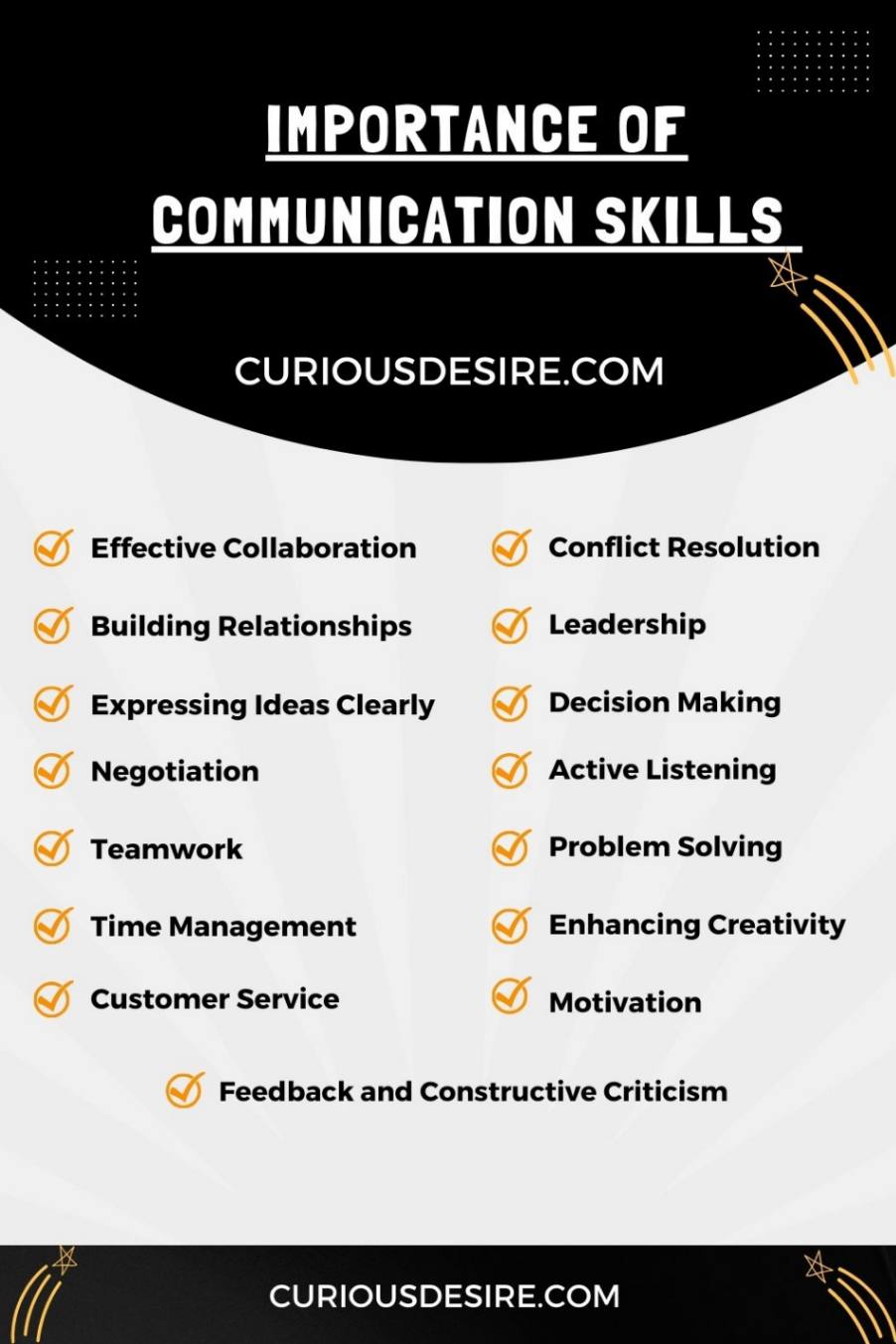Communication skills are like superpowers that help us connect with others, making life smoother and more enjoyable.
Whether it’s talking with friends, working in a team, or sharing ideas, good communication makes everything better.
It’s not just about talking; it’s about listening, understanding, and expressing thoughts clearly. Imagine it as a key that unlocks doors to success, whether in school, at work, or in our personal lives.
So, let’s explore why these communication skills are important and discover how they can make our daily interactions more meaningful and successful.
Here are the 5 common reasons of the importance of communication skills:
- Effective Collaboration
- Active Listening
- Problem-Solving
- Building Relationships
- Teamwork
1. Team Collaboration
Team collaboration is like putting together a winning project at work. Imagine a team working on a big presentation – each person has a part, like researching, designing, or writing.
If everyone communicates well and supports each other, the presentation becomes impressive and effective. It’s the same in any workplace.
Projects come together smoothly when colleagues collaborate, share ideas, and contribute their strengths.
Team collaboration is not just about completing tasks; it’s about a group of individuals joining forces to create something outstanding, whether a successful project presentation or achieving a common work goal.
2. Building Relationships
Building relationships in the workplace is like the journey of forming bonds similar to those among friends. Picture yourself starting a new job; it’s not just about the tasks you do but also about the people you work with.
Taking the time to know your colleagues, sharing experiences, finding common interests, and even sharing a good laugh during lunch – these moments go beyond the professional realm.
In this friendly and comfortable atmosphere, collaboration becomes more natural, communication flows effortlessly, and the overall work experience becomes enriched with a feeling of unity and mutual support.
Building relationships is the heart of a positive work environment, where people not only excel in their tasks but also the warmth of workplace friendships.
3. Conflict Resolution
Handling conflicts at work is a bit like figuring out a puzzle together. Let’s say there’s a disagreement in the team about the direction of a project – it’s like everyone has different ideas about how to complete the puzzle.
Here, good communication skills come into play as team members talk, listen, and find a solution that works for everyone. It’s similar to friends working together to decide the best way to tackle a challenge.
Resolving conflicts helps the team move ahead smoothly, creating a workplace where everyone feels heard and valued, just like when friends work together to solve a tricky puzzle.
4. Leadership
Think of a project leader as the guide in a group project, giving directions, keeping everyone motivated, and making sure everyone works together. Good communication is super important for a project leader.
It’s like explaining the project goals clearly, listening to different ideas, and helping the team stay on track. Imagine a project leader not talking to the team – it would be like a leaderless ship, confusing.
So, good communication is key to making sure everyone in the project understands the goals and works together smoothly.
5. Decision Making
Decision-making is like picking the best path for everyone to walk on. It’s important because it helps the group move forward without getting stuck.
Good communication is vital here because it’s like everyone talking and sharing ideas to figure out the best path. Imagine friends trying to decide where to go for a day out.
If they don’t talk and share their thoughts, they might end up going in different directions.
Communication helps in decision-making by making sure everyone is heard, ideas are considered, and the best choice is made for the group. It’s like everyone in the group is on the same page and moving ahead together.
6. Active Listening
Active listening is like turning up the volume to catch the tune. It’s important because it shows you care about what someone is saying. Good communication means more than just hearing; it’s about truly understanding.
For example, picture yourself in an office meeting. If you’re not actively listening, it’s like trying to participate in the discussion with your ears plugged – important details might slip by.
Active listening in the office makes conversations more productive, ensuring everyone’s input is valued, and decisions are made collectively. It’s like creating a workplace symphony where every voice contributes to the overall harmony.
7. Expressing Ideas Clearly
Expressing ideas is important because it helps others understand what’s in your mind. Good communication here is like turning on a bright light, ensuring your message is vivid and easily understood.
Imagine you have a great idea for a project, but if your words are unclear, it’s like trying to show a picture in the dark.
Clear communication makes sure your ideas shine brightly, and everyone can see the picture you’re trying to create. It’s like using a clear flashlight to guide others through the thoughts in your head.
8. Problem Solving
Problem-solving is like fixing a puzzle as a team. It’s important because it helps the group overcome challenges and move forward.
Good communication is important here, similar to everyone sharing their thoughts to figure out the best solution.
For instance, imagine a team facing a complex issue at work – if they don’t communicate and discuss possible solutions, it’s like trying to solve a puzzle without talking to each other.
Communication in problem-solving ensures everyone’s ideas are considered, leading to effective solutions that benefit the entire team.
9. Negotiation
Negotiation is like finding a middle ground that everyone can agree on. It’s important because it helps in resolving conflicts and reaching fair agreements.
Good communication is vital in negotiation, much like everyone talking and listening to find a solution that works for everyone.
For example, imagine a team deciding on project timelines – if they don’t negotiate and communicate their needs, it’s like trying to find a meeting point without talking.
Communication in negotiation guarantees that everyone’s concerns are heard, creating a win-win situation where agreements benefit all team members. It’s like finding a compromise that satisfies everyone’s needs, promoting teamwork and harmony.
10. Teamwork
Imagine a team in a marketing department working on a campaign – if they don’t communicate well, it’s like each member promoting a different message instead of a unified marketing strategy.
Communication in teamwork ensures that everyone understands their role, ideas are shared, and the group progresses toward success.
In the dynamic realm of marketing, effective teamwork is the key to crafting a compelling narrative and achieving marketing goals with precision and unity.
11. Time Management
Effective communication is vital for time management in the office. It’s like everyone is on the same page of a shared calendar.
For example, imagine a project with tight deadlines – if team members don’t communicate well about timelines and priorities, it’s like different team members working on separate schedules, leading to delays.
Communication makes sure that everyone understands deadlines, priorities are clear, and tasks are coordinated efficiently. It’s like syncing everyone’s watches to make sure the team’s time ticks in harmony toward project completion.
12. Enhancing Creativity
In the workplace, communication is important for promoting creativity, much like a team collaborating on a shared project. Picture a marketing team brainstorming ideas for a new campaign.
If there’s a communication breakdown, team members may miss out on valuable insights, and the campaign might lack innovation.
Effective communication guarantees that everyone contributes their creative input, resulting in a campaign that stands out and captures the audience’s attention.
It’s like assembling a workplace collage where diverse ideas blend effortlessly, creating a vibrant and impactful outcome.
13. Motivation
Communication is fundamental to maintaining motivation in the workplace. Consider a scenario where a team achieves a significant milestone, but if this accomplishment isn’t effectively communicated to the team members, it’s like celebrating a victory in silence.
Without proper communication, team members may not fully grasp the impact of their efforts, leading to a lack of motivation.
On the contrary, regular communication about achievements, milestones, and individual contributions serves as a motivational catalyst.
Effective communication becomes the motivational glue that binds individuals together, promoting a sense of shared success and encouraging ongoing dedication to common goals.


